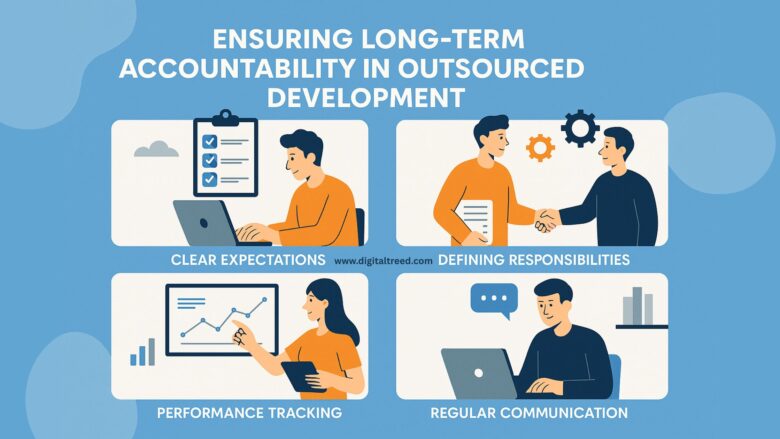Working with an outsourced development team can save money, give access to skilled people, and help finish projects faster. To keep long-term accountability, it is important to set clear goals, track progress often, and have open communication. Regular feedback and defined expectations help everyone understand what needs to be done.
Good teamwork is built on trust, regular updates, and an agreement that lays out clear responsibilities. When both sides share feedback and keep each other informed, the team stays on track and meets project needs.
Readers will learn useful strategies for working with outsourced teams and keeping accountability strong. These steps help projects run smoothly and help everyone reach their goals together.
Establishing Long-Term Accountability
Accountability builds trust in outsourced development. Clear roles, direct communication, and measurable results all make work smoother for everyone involved.
Setting Clear Expectations and KPIs
Clear project expectations help outsourced teams understand exactly what is required. Defining key performance indicators (KPIs) makes tracking team progress direct and measurable. These KPIs may include meeting deadlines, code quality, user satisfaction, and budget targets.
Outsourcing agreements should include detailed milestones and regular checkpoints. Each goal needs written documentation to avoid misunderstandings. Regular reviews let both sides discuss problems early. Using straightforward language in contracts, tasks, and instructions not only prevents confusion but also guides the team toward delivering results long term. Teams that deliver the services offered by Netcorp Software Development Outsourcing Company often set these agreements at the start of projects.
Implementing Transparent Communication Channels
Communication should be fast, open, and easy to track. Using tools like video meetings, instant messaging, and project boards allows everyone to stay up to date. Real-time communication prevents bottlenecks from slowing development.
It is important to set a fixed meeting schedule, such as daily stand-ups or weekly check-ins. All sides should use clear language and document every decision and change. Sharing goals, progress updates, and feedback helps keep the team focused. Written records and chat logs can be checked later if questions come up about what was decided.
Utilizing Performance Tracking Tools
Performance tracking tools allow teams to measure progress against goals. Project management platforms offer dashboards that show current tasks, deadlines, and assigned workers. Time tracking software gives a clear view of how much effort each task takes.
Regular reports make it easier to spot slowdowns and fix problems early. Automation within tools reduces manual work, keeps data accurate, and lessens delays in communication. Teams and their managers should review metrics regularly to see if any changes are needed. These tools help maintain accountability by making results visible and easy to verify at a glance.
Defining Ownership and Responsibilities
Defining who is responsible for each task avoids confusion and stops mistakes before they happen. Before a project begins, a detailed roles and responsibilities list helps everyone know what is expected. This includes project managers, developers, testers, and support staff.
Ownership creates a sense of pride and encourages team members to deliver what they have promised. When issues come up, it is easy to see who handles them, making it simpler to find solutions quickly. This clarity supports honest feedback and helps teams learn from mistakes, improving results for future projects. Each person having clear duties leads to smoother teamwork and stronger accountability.
Read Also: The increasing role of outsourced talent in software development
Sustaining Engagement and Results
Maintaining engagement and steady results from an outsourced development team requires a set of ongoing actions. Regular review processes, practical incentives, and close cooperation are key to meeting performance goals and maintaining accountability over time.
Conducting Regular Performance Reviews
To keep track of progress, managers should set up scheduled check-ins, such as monthly or quarterly reviews. These meetings help both sides look at metrics like completed tasks, productivity rates, and project milestones. Feedback sessions can address mistakes early, point out areas for skill development, and highlight team accomplishments.
Written performance reports should be used to keep a historical record and provide transparency. If issues appear, managers and team leads should work together on setting simple action items, so problems do not build up over time. Simple summaries or scorecards help everyone see what’s working and what needs work.
Incentivizing Ongoing Improvement
Positive motivation supports better long-term results. Using rewards such as bonuses, professional growth opportunities, or public recognition in team meetings can help keep team members moving forward. Setting up a system that connects a clear achievement to a clear reward makes the process fair and predictable.
A list of possible incentives includes:
- Short-term project bonuses
- Extra paid time off
- Access to special training courses
- Clear pathways toward larger roles in the team
This approach gives team members a personal reason to keep performing well and seeking new skills.
Promoting a Collaborative Partnership
Strong partnerships are built on mutual respect, shared goals, and regular communication. Leaders should share project goals, invite the team to offer feedback, and keep an open channel for questions or concerns. Simple group chats, shared documents, and regular video calls help remove barriers caused by distance or time zones.
Openness in communication helps build a sense of trust. When the team feels that their work is connected to the bigger picture, they are more likely to stay focused, speak up about risks, and commit to long-term results. Delegating meaningful tasks and listening to input gives team members a stake in the project’s success.
Read Also: 6 Reasons Why Full Stack Development is Right for Your Business
Conclusion
Clear expectations, regular check-ins, and open communication help keep a development team on track. Simple tools for monitoring progress make accountability more straightforward. Written agreements and feedback loops also build trust over time.
Lasting results depend on a mix of structure, feedback, and teamwork. With these steps, projects can stay on schedule and reach goals.

Leave a Reply